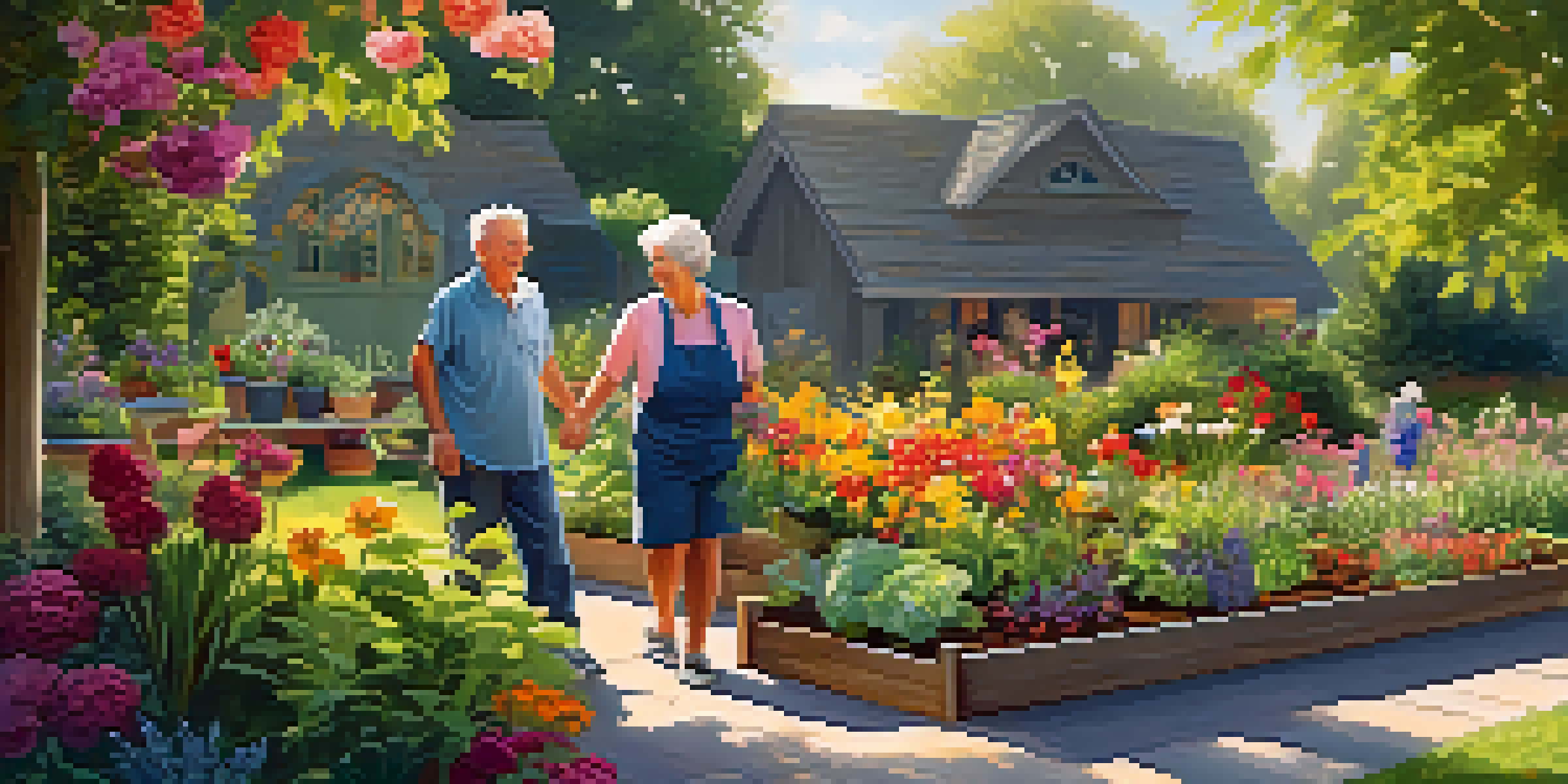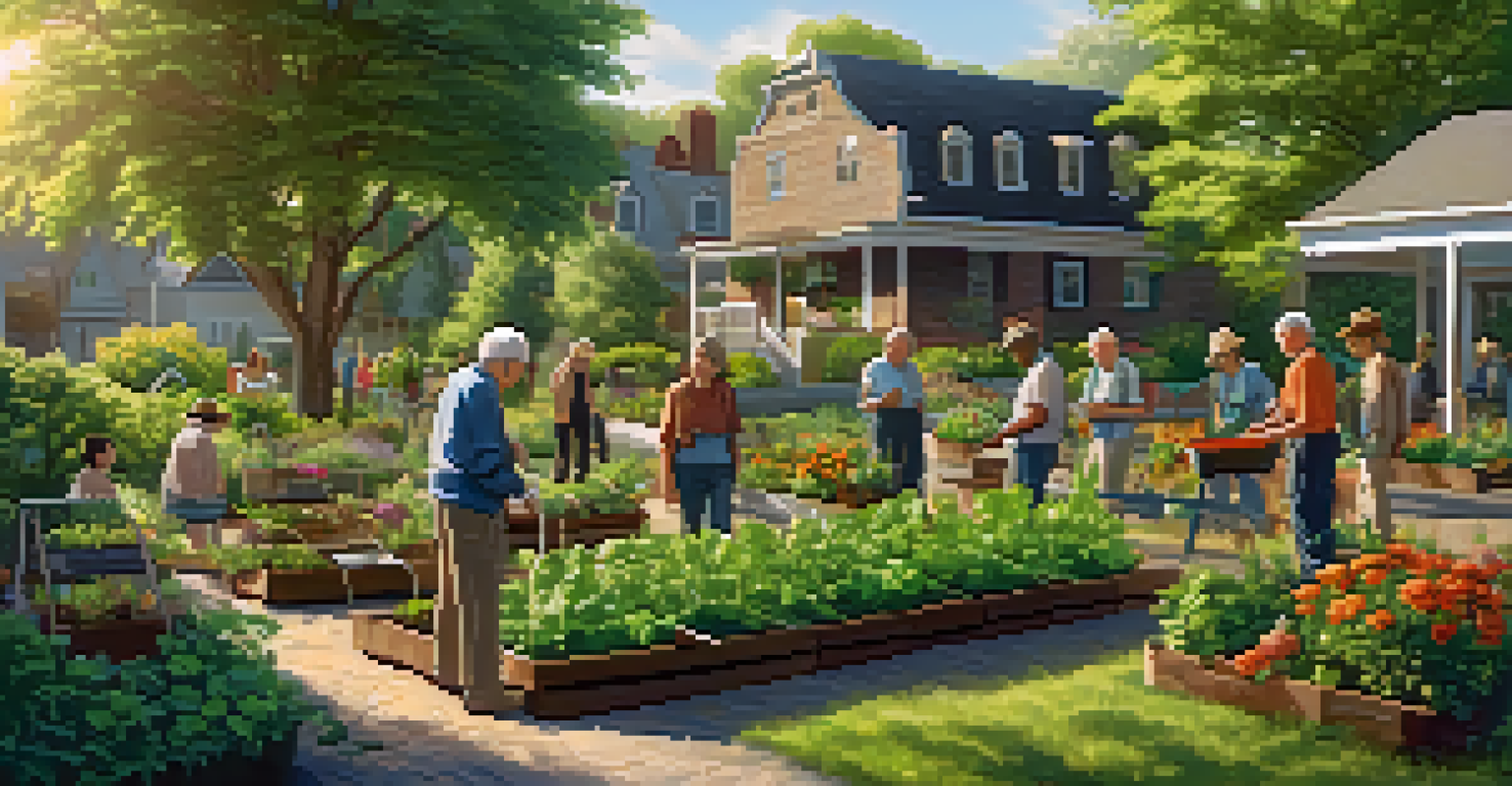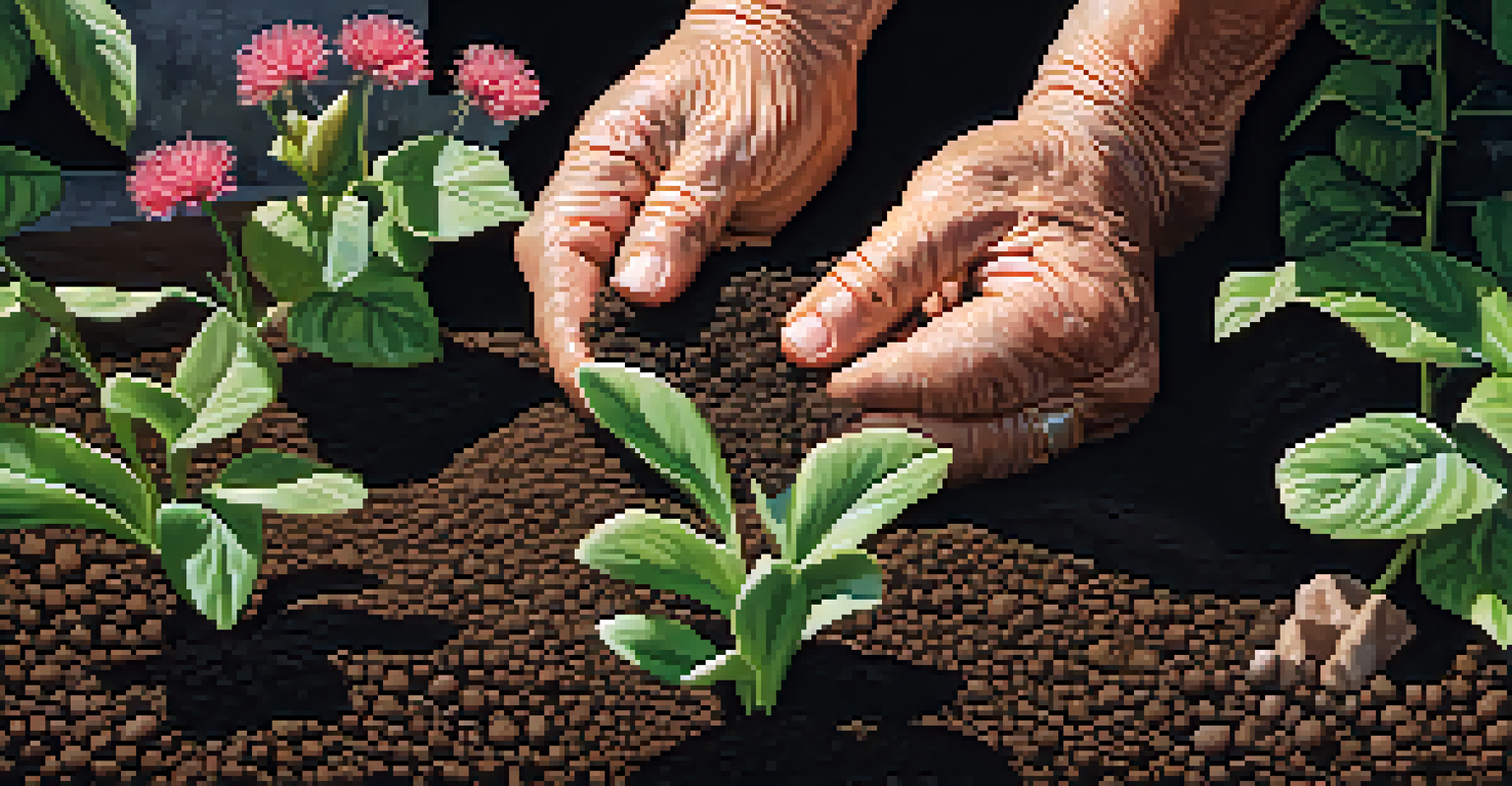Gardening for Seniors: Benefits for Physical and Mental Health

The Joy of Gardening: A Therapeutic Escape
Gardening offers seniors a delightful way to connect with nature, providing a therapeutic escape from daily routines. The simple act of planting seeds or tending to flowers can evoke a sense of purpose and accomplishment. Moreover, being outdoors can boost mood and reduce feelings of isolation, fostering a deeper appreciation for the world around them.
To plant a garden is to believe in tomorrow.
Engaging with plants can serve as a mindful practice, allowing seniors to focus on the present moment. This mindfulness can be incredibly beneficial for mental health, helping to alleviate symptoms of anxiety and depression. Just like a good book can transport us to another world, gardening can create a personal sanctuary filled with beauty and tranquility.
In essence, gardening acts as a gentle reminder to slow down and savor the little things in life. It's not just about growing plants; it's about nurturing a connection with oneself and the environment. This therapeutic aspect makes gardening a perfect hobby for seniors seeking balance and joy.
Physical Benefits: Strengthening the Body
Gardening is a low-impact exercise that can significantly improve physical health for seniors. Activities like digging, planting, and weeding engage various muscle groups, promoting strength, flexibility, and coordination. These movements can help combat the effects of aging, keeping the body more agile and active.

Regular gardening can also enhance cardiovascular health. As seniors move around their gardens, they elevate their heart rates, which is great for circulation and overall heart health. Plus, spending time outdoors exposes them to vitamin D from sunlight, essential for bone health and immune function.
Gardening Enhances Mental Well-Being
Engaging with plants fosters mindfulness, reduces stress, and can alleviate symptoms of anxiety and depression.
By incorporating gardening into their routine, seniors can enjoy a fun and fulfilling way to stay active. It’s like turning a chore into a workout, where the reward is not just health, but also the beauty of a flourishing garden. This dual benefit makes gardening an ideal activity for maintaining physical well-being.
Mental Stimulation: Sharp Minds Through Gardening
Gardening is not just physically engaging; it also stimulates the mind. Planning a garden layout, researching plant types, and figuring out the best care practices keep cognitive skills sharp. This mental workout can be particularly beneficial for seniors, as it encourages problem-solving and critical thinking.
Gardening adds years to your life and life to your years.
Moreover, learning about different plants and their needs can ignite curiosity and creativity. Whether it’s experimenting with new varieties or creating themed gardens, these activities foster a sense of exploration. This continuous learning can be a refreshing change from routine, keeping the brain active and engaged.
By keeping the mind stimulated, gardening can help delay cognitive decline. It serves as a gentle reminder that engaging in hobbies can enhance mental acuity, proving that age is just a number when it comes to learning and growth.
Social Connections: Cultivating Community
Gardening can be a wonderful way for seniors to foster social connections. Whether it’s joining a community garden or participating in gardening clubs, these activities create opportunities to meet like-minded individuals. Sharing tips, plants, and gardening stories can lead to lasting friendships and a strong support network.
Community gardening, in particular, encourages collaboration and teamwork. Seniors can work together to cultivate a shared space, which not only beautifies their surroundings but also strengthens bonds among neighbors. It’s a fantastic way to combat loneliness and create a sense of belonging.
Physical Activity Through Gardening
Gardening provides low-impact exercise that improves strength, flexibility, and cardiovascular health for seniors.
Additionally, social interactions in gardening can lead to increased happiness and reduced stress levels. Engaging with others over a shared passion can uplift spirits and enhance overall emotional well-being. Gardening truly becomes a bridge connecting individuals and communities.
Mindfulness in Motion: The Zen of Gardening
Gardening naturally invites mindfulness, encouraging seniors to immerse themselves in the present moment. The rhythmic motions of digging, planting, and watering can serve as a meditation, helping to quiet the mind and reduce stress. This focus on the here and now is a powerful antidote to worries and distractions.
Moreover, the sensory experiences in gardening—feeling the soil, smelling the flowers, and observing the changing seasons—enhance this mindful practice. Each of these elements can ground seniors, helping them connect with their surroundings and themselves in a profound way. It’s akin to yoga, where the body and mind work in harmony.
As seniors embrace this meditative aspect of gardening, they often report feeling more centered and at peace. This sense of tranquility can contribute to improved mental health and overall happiness. In short, gardening becomes a holistic practice that nurtures both the mind and body.
Nutrition Boost: Fresh Produce at Your Fingertips
One of the most rewarding aspects of gardening is the ability to grow fresh produce. For seniors, having a home garden can significantly enhance their nutrition by providing easy access to fruits and vegetables. Consuming fresh produce is vital for maintaining health, especially as dietary needs change with age.
Growing one’s own food also encourages healthier eating habits. Seniors can experiment with different recipes and learn new ways to incorporate their homegrown goodies into meals. This not only promotes better nutrition but also fosters a sense of accomplishment as they enjoy the fruits of their labor.
Community Connections via Gardening
Joining community gardens or clubs cultivates social interactions, leading to friendships and a sense of belonging.
Additionally, cultivating a garden can spark interest in sustainable practices. Understanding where food comes from and how it’s grown can lead to more mindful eating choices. By embracing gardening, seniors can nurture their bodies while enjoying a deliciously rewarding hobby.
Accessible Gardening: Making It Senior-Friendly
To fully enjoy the benefits of gardening, it’s essential to make it accessible for seniors. Raised garden beds, for instance, can reduce the strain of bending over, making planting and tending easier on the back and knees. Ergonomic tools designed for comfort can also enhance the gardening experience.
Choosing low-maintenance plants is another way to cater to seniors' needs. Opting for hardy, drought-resistant varieties can minimize the time and effort spent on upkeep, allowing seniors to enjoy their gardens without feeling overwhelmed. This way, they can focus on the joy of gardening rather than the labor it requires.

Lastly, involving family members in gardening can create a supportive environment. Gardening together not only makes tasks easier but also fosters family bonding. With a little creativity and planning, gardening can be a joyful and accessible activity for seniors of all abilities.